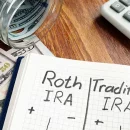5 Mistakes to Avoid While Rebalancing Your Portfolio
The success of your investments depends on how you keep track of and manage your investment portfolio. Maintaining equilibrium between risk and reward, diversifying your investments optimally, timing the market, knowing when to enter and exit, etc., are some ways that you can use to ensure that your portfolio fares well over time and delivers the returns that you expect from it. Creating a high-yielding portfolio can take time, effort, proper knowledge, awareness, and a lot of foresight. This may not come naturally to all investors, but seeking professional help from a financial advisor can do the trick.
However, your job as an investor does not finish here. Merely creating a portfolio is not enough. It is also important to revisit it from time to time. This periodic revision of your investments is known as portfolio rebalancing. Rebalancing is a crucial part of the process of investing and one that should not be ignored.
If you often find yourself asking questions such as – “should I rebalance my portfolio?” or “how often should I rebalance my portfolio?”, then this article is for you.
What is portfolio rebalancing?
Assume that when you first created your portfolio, you allocated 80% of your money in stocks and the remaining 20% in bonds. Now, over time, your stock investments boomed while your bond investments did not do as well. As a result, the value of your stock investments would increase with respect to the value of bonds on your portfolio. This disproportionate change in the value of your portfolio can negatively impact your goals. In this example, an increase in the value of stocks may lead to better earnings, but it will also expose you to more risk. Likewise, the safety and low risk of bonds will be greatly reduced, thereby, affecting the long term stability of your investments.
Portfolio rebalancing refers to bringing your portfolio’s asset allocation back to what it was when you started investing. So, if your stock investments have increased, you could sell them off and invest the money in bonds until your asset allocation is back to the ratio of 80:20. Rebalancing can also be done by investing fresh money in bonds and bringing the ratio to the original figure. In this case, you would not have to sell your stocks.
Why should I rebalance my portfolio?
Rebalancing your portfolio is necessary for a number of reasons, some of which have been mentioned below:
- It ensures that your risk tolerance is maintained throughout the term of your investments. Rebalancing helps you balance your risk and create the preferred balance between stocks and bonds.
- Since the price of your investments is bound to fluctuate over time, it is important to review your portfolio every now and then to track its performance.
- Rebalancing your portfolio helps you gauge how your money has fared and which of your investments are doing well. This allows you to make timely corrections.
- Portfolio rebalancing stops you from making hasty decisions. For instance, if the market crashes and your equity investments plummet, your first instinct would be to sell them. However, instead of reacting to the market, another course of action here could be to rebalance your portfolio. Since the equities would have dropped, your bond investments would have risen in value. If you rebalance your portfolio now, you would sell some bonds and replace them with buying stocks at a lower price. This could result in high profits when the market rises again.
What not to do while rebalancing your portfolio?
Now that you know the answer to “should I rebalance my portfolio”, it will also help to understand the kind of mistakes that can impact you negatively while portfolio rebalancing.
Broadly speaking, you must be wary of committing the following five errors:
1. Taking matters into your own hands:
Portfolio rebalancing is not all that hard, but it can certainly be tricky, especially if you are an inexperienced investor. Secondly, if you have wide-ranging investments on your portfolio like cash, mutual funds, stocks, bonds, etc., you may find it overwhelming to rebalance your investments on your own. Taking matters into your hands may lead to unwise decisions that can harm you later. A lack of experience or prior knowledge of investing can also contribute to hasty decisions. Similar to the example mentioned above, you may wish to sell equity when the market crashes. However, this may not always be the best course of action. Hence, it may be advised to consult a professional financial advisor for guidance.
2. Focusing solely on profits and loss, rather than the level of risk:
Most investors think of rebalancing as ‘correcting’ their portfolios. They look for losses and problems that need to be solved. While this may be true to an extent, it cannot be applied to every situation. Portfolio rebalancing can help you rectify mistakes and upturn losses, but it is not limited to that alone. The primary purpose of rebalancing is to redistribute risk optimally. Hence, instead of focusing on profits and losses, try to realign your focus to your risk profile. Your current profits already expose you to some risk. Hence, it may be advised to pay attention to them. Similarly, any potential losses can be a risk in the future. Hence, you must not ignore them too.
3. Ignoring the tax repercussions:
Selling your investments also triggers your tax liabilities. Hence, when you rebalance your portfolio, you must look at your potential tax liability and how it impacts your overall earnings. When you sell your investment at a profit, you earn a capital gain. This capital gain is taxed in two ways. The first is known as short-term capital gains tax, and the second is known as long-term gains tax. Short-term capital gains are gains that you earn from selling assets that have been held for one year or less. And long term capital gains are gains that you earn on assets that have been held for more than one year or more. Short-term capital gains are added to your regular income and taxed according to the tax slab you fall into. Federal income tax rates are levied on these gains similar to your other incomes. Long-term capital gains, on the other hand, are taxed at a different tax rate. These are lower than federal income tax rates.
You must understand how your earnings will be taxed before you rebalance your portfolio. Keep in mind the purchase date of each asset so you can make an informed decision. In addition to this, you can also use strategies like tax-loss harvesting. Under this method, you can sell your assets at a loss to reduce your capital gains. However, while this can help you lower your tax output, it does have certain rules. As per the directions of the Internal Revenue Services (IRS), selling an asset at a loss and purchasing the same asset or an identical one within 30 days is known as a wash sale. If you make a wash sale, you will not be able to use tax-loss harvesting to reduce your taxability. Therefore, remember to be up to date with the prevailing tax rules to avoid errors in judgment.
4. Falsely diversifying your investments:
When you rebalance your portfolio, you must be careful to include investments that truly diversify your portfolio. For instance, you may think that adding bonds like high-yielding bonds or emerging market bonds will reduce the risk on your portfolio. But, in reality, these bonds could carry a higher risk than high-quality bonds. Adding these as a measure to reduce risk could eventually backfire. The purpose of adding more bonds while rebalancing is to reduce overall risk. However, if you select high-risk bonds, you may increase the risk. Hence, be careful about where you invest your money.
5. Ignoring your financial goals:
Keep in mind that your portfolio must at all times reflect your final financial goals. For instance, if your goals are long-term in nature and you have a considerable amount of time left, you can keep a heavy concentration of equities after rebalancing your portfolio. However, if you are nearing your goal, you may have to rethink your strategy. For instance, if you are rebalancing your portfolio a few years before retirement, you may not want to keep the same percentage of equities on your portfolio as before. If your asset allocation has changed and is now more concentrated on bonds, it would be better to maintain this ratio since retirement is not a favorable time to expose yourself to high-risk investments. Therefore, remember while portfolio rebalancing is used to restore the ratio of your stocks and bonds as they were initially, the final result should always align with your future goals.
How often should you rebalance your portfolio?
There is no right or wrong time to rebalance your portfolio. Some investors like to review and rebalance their portfolios at specific intervals, like once or twice a year. Others only do it when they find an imbalance in their portfolio. Generally, portfolio rebalancing once a year can be suitable for most people. However, if the market is too volatile and your investments have moved out of proportion, you may want to take a look at them sooner. If you are working with a financial advisor, your advisor can do this for you. Financial advisors keep track of your investments and recommend strategies to ensure maximum returns. Some advisors also offer portfolio trackers that can help you track your investments yourself. You can discuss these options with your financial advisor and take a call accordingly.
To summarize
Portfolio rebalancing is a must for all investors. No matter what the end goal is, rebalancing your investments from time to time can optimize returns and reduce risk. So, ensure that you undertake this important task as and when it is needed. Do take care to avoid the aforesaid mistakes as it will help you stay on track for reaching your financial goals. If you are not sure of how to rebalance your portfolio and need some professional assistance for the same, you can get in touch with a financial advisor in your area.
For additional questions on how to manage your portfolio, visit Dash Investments or email me directly at dash@dashinvestments.com.
About Dash Investments
Dash Investments is privately owned by Jonathan Dash and is an independent investment advisory firm, managing private client accounts for individuals and families across America. As a Registered Investment Advisor (RIA) firm with the SEC, they are fiduciaries who put clients’ interests ahead of everything else.
Dash Investments offers a full range of investment advisory and financial services, which are tailored to each client’s unique needs providing institutional-caliber money management services that are based upon a solid, proven research approach. Additionally, each client receives comprehensive financial planning to ensure they are moving toward their financial goals.
CEO & Chief Investment Officer Jonathan Dash has been profiled by The Wall Street Journal, Barron’s, and CNBC as a leader in the investment industry with a track record of creating value for his firm’s clients.














